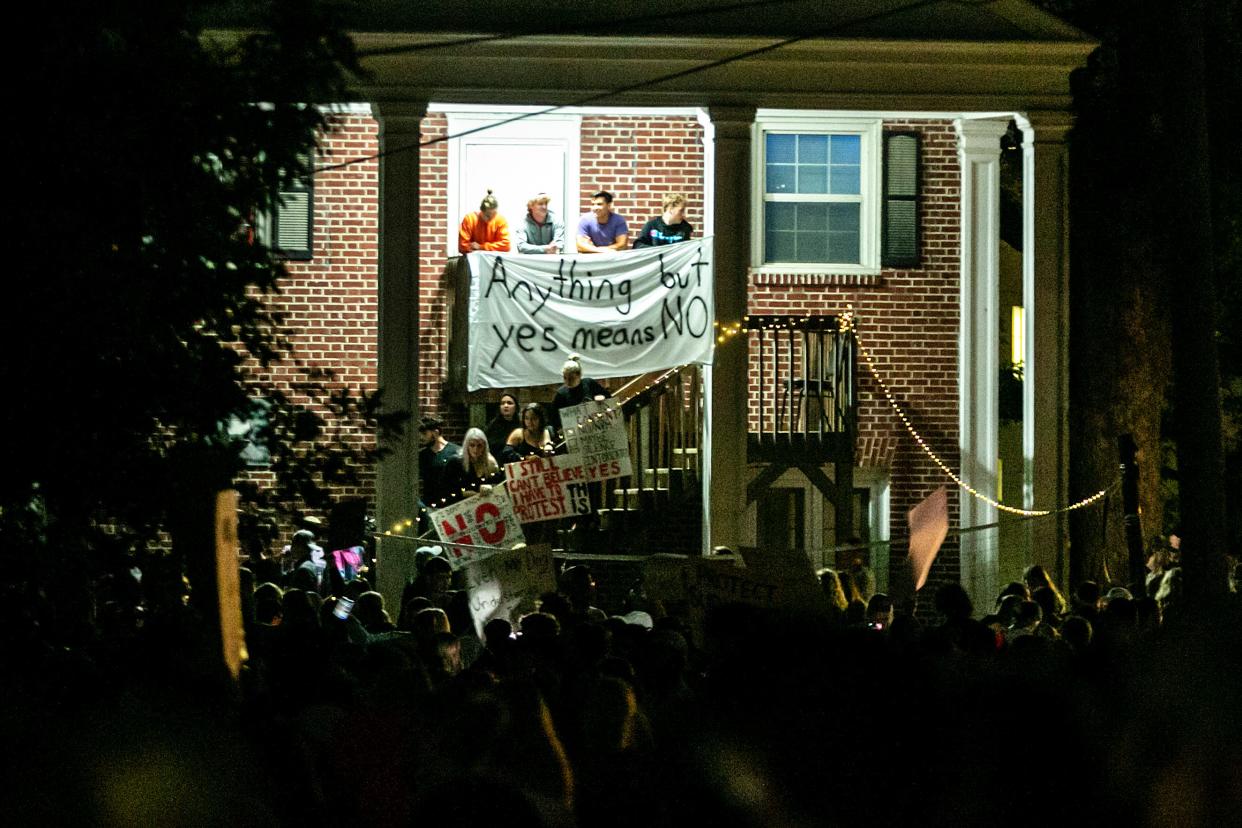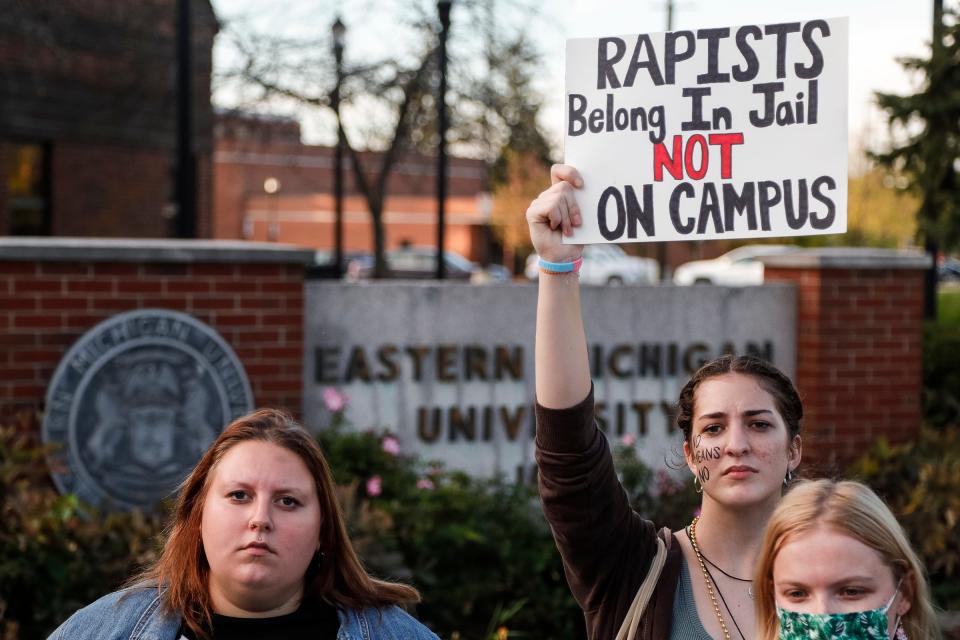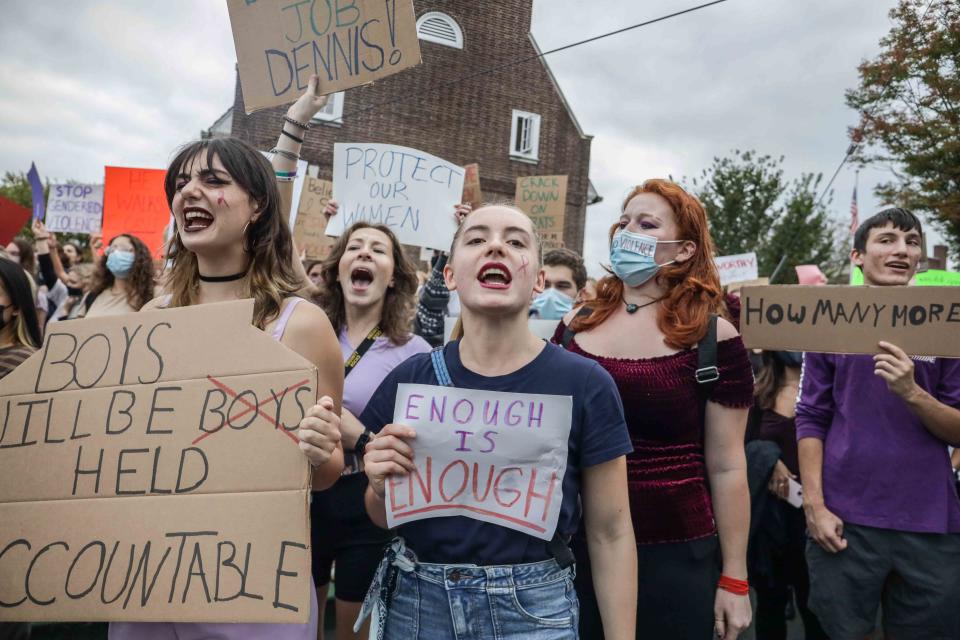College students protest fraternities over sexual violence. Will Greek life change?

Students have packed board meetings with university leaders. They have gathered hundreds-strong outside fraternity chapters. In some cases, they've flipped cars.
Though the specifics of the incidents and messages differ, a fresh wave of student protest has catalyzed around fraternities with members that have been accused of sexual assault.
The protests started with the beginning of the fall semester at large public universities, such as the University of Iowa, the University of Nebraska-Lincoln, the University of Kansas and the University of Massachusetts, Amherst. The movement has since spread to campuses in states including Alabama, California, Mississippi and New York.
College students often protest without incident or news coverage, but the demonstrations at Greek chapters have stood out for their frequency and fervor.
Some of the protests stemmed from nameless posts on social media, especially the platform Yik Yak, an app that allows students to post anonymously within a limited radius. Several involved allegations that men at fraternities drugged their peers. In many cases, the protests have served as rallying cries against universities that students say have been unwilling to crack down on Greek organizations whose members commit sexual violence.
Frats under pressure for years, with little change: Young men died in fraternities every year for two decades.
It’s unclear whether these short-term actions will result in long-term change, especially since impassioned undergraduates typically graduate and move on after a few years. Some advocates have pushed for universities to cancel Greek life altogether. Defenders of fraternities say that unfairly paints all fraternities and shutting down chapters drives students to gather in secret.
Something has changed, said Sarah McMahon, a Rutgers University professor who studies sexual violence within higher education. Undergraduates want administrations to do more than issue statements condemning sexual violence on campus, she said. They want a cultural change, too.
“If institutions are willing to say they’re committed to having safe, inclusive campuses, they need to take a real look at what’s prohibiting that,” she said. “There’s enough that’s gone wrong with fraternities that there needs to be some engagement and looking at that system.”
Stay in the know: For more news on colleges and other can’t-miss moments of the day, sign up for Daily Briefing.
Are fraternities the problem on college campuses?
About 1 in 4 college women report they have been assaulted as an undergraduate, according to the Rape, Abuse, and Incest National Network. (The advocacy group cautioned the actual numbers may be higher because some women opt not to report.)
More than half of the sexual assaults committed on college campuses take place during the fall months when many students are new to higher education, the organization said.
It’s difficult to say whether fraternities commit more acts of sexual violence than their peers on college campuses. Other all-male groups, such as athletic teams or military groups, have come under similar criticism, McMahon said.
Some research indicates men who join fraternities have attitudes that are more supportive or accepting of sexual violence, she said. But some studies have found fraternity members have about the same level of sexual aggression as other male college students.

Fraternity culture varies from college to college, and protests have taken place at public and private institutions small and large. The wave started with demonstrations in Iowa, Kansas and Nebraska in late August and early September. Since then, a protest has followed nearly weekly.
In early November, students at the University of Colorado, Boulder, held a protest after two women filed police reports saying they were assaulted at the local chapter of Pi Kappa Alpha. The Denver Post reported 500 to 600 protesters showed up.
Social media helps to drive protests
Though the protests take place now, the sentiments behind them have been brewing for months or years. Prisha Sujin Kumar, a senior at Boston University, and two other women started a group and Instagram account called Campus Survivors in spring 2020.
That group posts anonymous stories on Instagram from people who said they experienced sexual assault, mostly at Boston University. The group doesn’t verify the submissions, and it generally doesn't include information that would identify someone. Some posts do include locations, universities or groups by name.
Other Instagram accounts posting anonymous assault stories have sprung up at Arizona State University, Brown and the University of Vermont.
Sujin Kumar said the Boston University account serves two purposes. First, the creators wanted a space for people who have experienced sexual assault to be able to share their experiences. Many women, Sujin Kumar said, don’t feel comfortable sharing their stories with law enforcement or their universities. Second, they wanted to show people sexual assault may be happening on their campuses.
That heightened awareness has driven this year's protests, Sujin Kumar said.
“When students see that it’s not just their college, it brings even more anger,” Sujin Kumar said.
Sexual assault hotline calls set a record during the pandemic: Many reaching out are children.
Are protests unfair to fraternities?
Jud Horras, CEO of the North American Interfraternity Conference, is unequivocal about stamping out sexual assault within Greek life. But Horras, whose trade association unites 57 national fraternities and more than 6,000 chapters, disagrees with some of the approaches by critics.
Specifically, he is frustrated with protesters who demonstrate against fraternities that report and take action when they encounter sexual assault. The NIC instructed fraternities to create a plan to address sexual misconduct and to report any incidents to their university and police.
Horras called for activists to hold students accountable publicly, rather than encouraging anonymous accusations on social media.
Few chapters, he said, have closed as a result of the latest movement.

Fraternities bring value to campus, he said. Men in the groups are often more engaged with their campus and often have higher grades than their peers. Some fraternity members have even joined the protests.
He said abolishing Greek life would be counterproductive: Students are going to gather in groups even if they're not recognized by the university, so colleges should want to continue official groups they can sanction.
Secret frats are real: What else to look out for during college fraternity rush
'It's a very uphill battle'
The pressing question for the activists remains: Will anything change?
There’s mixed evidence. Universities have expelled students, as was the case at the University of Delaware. The University of Nebraska announced it would increase resources for survivors of sexual assault on campus. It issued a five-year suspension to the chapter at the center of the protests, citing an infraction of the university's alcohol policy.
In other instances, fraternities expelled members or voted to halt social activities for the year.
After starting their account, Sujin Kumar and the founders of Campus Survivors noticed many of the stories were tied to one fraternity: Kappa Sigma. That group had been suspended at Boston University in 2015 but was allowed to reopen.
She and her co-founders reported what they found to the university. Kumar wrote open letters to the university detailing her concerns.
When that didn’t get the traction they wanted, they protested the fraternity in February and again in October. Boston University has since suspended the chapter for holding a party and meeting while the group was supposed to abstain from social activities.
Kenneth Elmore, an associate provost, told the university's in-house news service the university needed to speak to members of the fraternity while it investigated.
"I told them that before they did any more programming, they would need to get my approval," Elmore said of the chapter. "They did not do that, so we moved to suspend them."
Sujin Kumar said she was glad to see the university take action, but it feels like administrators still haven't gotten the point.
"It's just really frustrating, to say the least. … They are being forced to change," she said. "But it's a very uphill battle."
If you are a survivor of sexual assault, you can call the National Sexual Assault Hotline at 800-656-HOPE (4673) or visit hotline.rainn.org/online and receive confidential support.
This article originally appeared on USA TODAY: Fraternity protest over sexual assault: Can college Greek life change?

